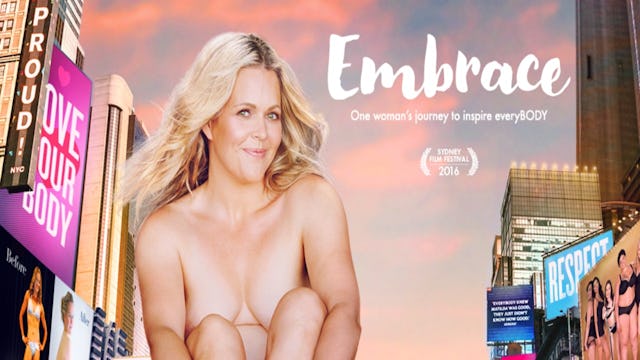Body-Positive Documentary Embrace Misses The Mark

The documentary Embrace begins with blonde, blue-eyed Aussie narrator Taryn Brumfitt discussing what happened when her before-and-after pics went viral. After the birth of one of her children, she decided to strive for the “perfect body.” She entered a bodybuilding contest — the before pic. And she realized that the other women competing weren’t any happier with their bodies than she’d been with her postpartum squish. It had taken her too much time and effort to get that “perfect” shape. She needed, she realized, to love the body she was in, not constantly deride it as a thing in need of change. So she let go.
And later, she took after pics — “tastefully starkers,” as her husband says. They’re very different from her former toned Wonder Woman physique. In the after pics, she’s soft. She’s squishy. She looks like one of us. And she looks beautiful.
Taryn gets her point across: All bodies are beautiful. I finished the documentary feeling good about myself and my body. I felt angry at the advertisers and fashion designers who’d convinced me that my body was unworthy and unlovable and unsexy. I felt great.
Except there’s only one problem: I’m a white, blue-eyed, middle-class American with some extra baby pudge. I’m like Taryn. But this documentary claims to “travel the globe.” “The culture of body loathing and body shaming had reached epic proportions worldwide,” the promotional website says. But this documentary isn’t worldwide in scope — not when it comes to destination, not when it comes to culture, and certainly not when it comes to race.
Taryn is an Australian, and several of her guests, including Turia Pitt, who was caught in a brush fire, are also Aussie. Many of her guests are American and a couple are British. One is from the Dominican Republic, and…that’s it. Not a whole lot of globe-trotting going on. Everyone speaks English without anything more than a regional accent.
Not that other people aren’t mentioned, of course. She throws out the statistic that “1 out of 5 five people in South Korea has had plastic surgery.” However, it’s just left there, hanging. But according to Business Insider, the most popular surgery in South Korea is eyelid surgery — eliminating the double lid to make the eye appear more Western. This demonstrates how the globalization of media has impacted citizens of non-Western countries — a point one of Taryn’s interviewees makes. In one of the few mentions of a non-Western culture, body-positivity activist Marika Tiggemann also says that this happened in Fiji. When Western media arrived, the girls suddenly started developing eating disorders. This in a culture that had previously celebrated voluptuous bodies as an example of plenty. But the topic is never explored further, and Taryn moves on.
Taryn periodically cuts to woman-on-the-street-type clips, where average people are asked to describe their bodies. These scenes see some diversity, with some black, Hispanic, and Arabic women calling themselves “disgusting” right alongside their white counterparts. But then…nothing. A black woman in the ending photoshoot describes her body as “big…beautiful…dangerously curvy.” That remains the only significant interview with a black person in the entire film, and it’s just a few lines long. About weight. Nothing about race, skin tone, or hair. Any other issues this woman may have with her body when held up against society’s misguided standards are erased in favor of a skinny vs. fat narrative.
To be fair, Taryn does talk to a few woman of other races and cultures, but she talks to them about their specific body image issues — facial hair, weight, and facial paralysis. But never does she touch on race. In a movie about body positivity, to ignore the significance of skin color as part of the conversation is downright criminal.
What about the Asian skin-bleaching industry? The prioritizing of lighter skin (colorism) in the African-American community? The globalization of media has done as much to make women feel bad about their skin color as it has about their size. If we’re talking about body positivity, we simply must include a discussion of race as well.
If you’re white, you’ll come away from this movie feeling empowered about your body. If you’re not, you’ll probably come away feeling left out — because you are. Your experience doesn’t count here. Perhaps Taryn didn’t know enough about the tangle of race and beauty to tackle it. Perhaps she didn’t want to. Perhaps she didn’t care. This is a gritty film about the realities of learning to love yourself, and the damage the beauty industry has caused. But it’s not for everyone. And everyone includes the non-white, the non-rich, the non-binary, and the non-Western.
Editors Note: this piece has been updated to correct inaccuracies with some names and ethnicities.
This article was originally published on